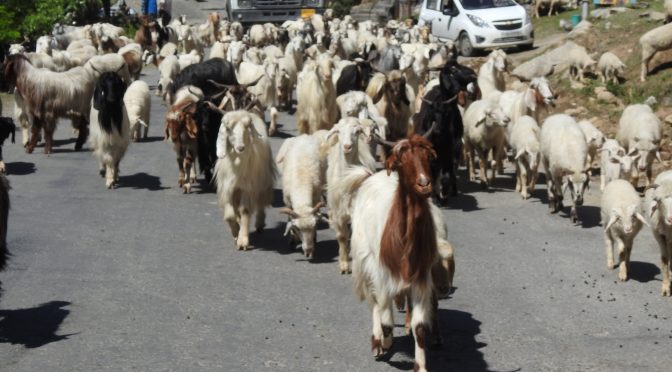While listening to an episode of Manoush Zomorodi‘s Note to Self from WNYC Studios I was fascinated by a comment from Professor Steve Renals the Chair of Speech Technology at Edinburgh University.
Renals referred to people as being like sheep and goats with respect to speech recognition systems. Relas suggests that sheep are people whose speech a system recognises well, and goats are people who systems don’t recognise well.
Neither the interviewer nor I had ever heard this turn of phrase before so I thought it was worthy of a little sleuthing.
The first article I came across was entitled Goats are from Mars, Sheep are from Venus – a weird title for an article by Dr. Anna O’Brien and worthy of a read if you are at all interested in animal husbandry.
O’Brien points out that taxonomically speaking, sheep and goats are quite different. Sheep are Ovis aries and goats are Capra hircus. Sheep have 54 chromosomes and goats have 60! There are of course loads of other differences too, their hair, their flocking behaviour and what they eat. So even though as a lay person you might think that they seem the same they aren’t.
If you think this seems all rather pointless and silly, consider the fact that a piece even appeared in a lighthearted NPR piece by Marc Silver entitled Is This A Goat Or A Sheep? It’s Harder Than You Think.
In that article, Silver points out that goats and sheep occupy different niches, sheep are predominantly grazers, and goats are browsers – this then results in goats spending a lot of time “investigating things… they have more exploratory, investigate behavior because of their feeding style. They appear to be more interactive with the environment, and they are very engaging animals“.
This left me all still a little perplexed on where Renals’ turn of phrase comes from.
Some clues emerged in a little trawling of religious sites, where reference is made to biblical texts principally the “parable of the sheep and the goats” Matthew 25:31–34, 41, 46 that suggests that the shepherd “separates the sheep from the goats. And he will place the sheep on his right, but the goats on the left”. This goes on to suggest that “A sheep is led by its shepherd. A goatherd is led by his goat”. It’s really obscure but in a nutshell – sheep tend to follow but goats go their own way.
So what Renals was in fact saying is that speech recognition works well for the majority but there are those for whom it just doesn’t behave as expected – they’re the speech recognition system goats.
That’s not to say that technologically a sheep is better than a goat, simply, that this may provide an interesting perspective on why some of us are effectively outliers when it comes to the technology working as it should for us. Perhaps this ends the Mac vs. PC debate? Android vs. iOS?
In the end I guess it comes down to a little self analysis, irrespective of whether the tech works or not.
I found it interesting that a piece posted by BBC News on YouTube back in 2015 suggested that for the Chinese at least, there is ambiguity. The commentaries challenged this but the piece suggested that when looking at the Chinese zodiac. In Mandarin “yang” or “horned animal” covers sheep, goats and rams and that the sheep is one of the least desirable animals of the zodiac because they are seen as docile, weak followers.
Do you or me, as individuals, think of ourselves as a sheep or a goat ?
What does being a sheep or a goat ultimately mean to us in how we tackle problems, approach the world and deal with others and how they deal with us? What do you do when you recognise that you are a sheep and you’re dealing with a goat?
Even if you consider yourself a goat, we all know a goat when we see one, surely?
The original version of this was posted on LinkedIn
Photo by Harvinder Chandigarh
